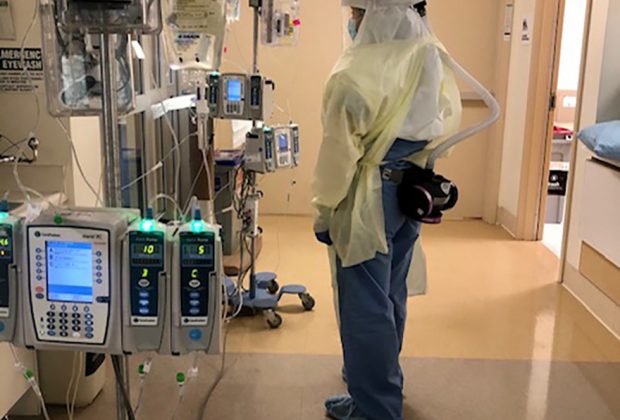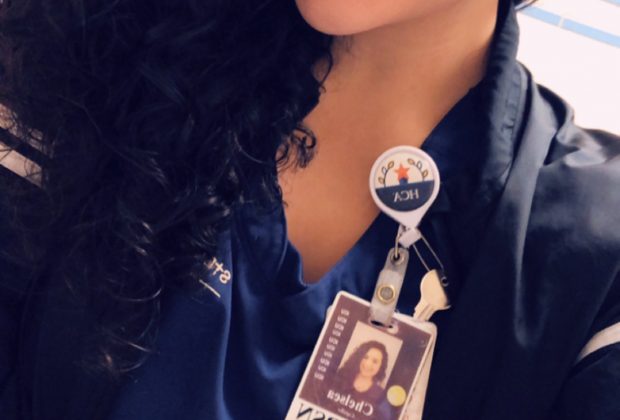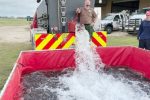On the front lines: Lockhart native battles COVID-19 in New York City
By Wesley Gardner
LPR Editor
Every evening at 7 p.m., thousands of hands holding pots and pans can be seen hanging out the windows of the apartment complexes lining the streets of downtown Manhattan
“Everyone’s banging. Everyone’s clapping,” said Lockhart native Chelsea Capello. “Fire trucks are going off.
“Ambulances are going off. It’s kind of like my alarm clock. It makes me feel a little bit better about to going in to work.”
For Capello, waking up at 7 p.m. is part of the job. She’s working nights as an intensive care unit (ICU) nurse in a hospital in New York City, which currently has more than 156,000 confirmed cases of COVID-19 resulting in 5,228 deaths, making it the global epicenter of the outbreak.
Capello knew the danger involved when she accepted the 8-week contract a few weeks ago, but she wouldn’t be deterred.
“I was a kid when 9/11 happened, and I was also really young when hurricane Katrina happened,” said Capello, who’s now 25. “I wasn’t a nurse during those times, but I would have loved to have been able to help.
“Now with everything going on here, with New York being the epicenter and with the mortality numbers at the rate they are, I was like, ‘OK, I have the skills to help and that’s what I need to do.’”
Capello said her parents, who own Chisholm Trail BBQ in Lockhart, weren’t exactly thrilled at the prospect of their daughter traveling to the coronavirus hotspot. They begged her for about a week to reconsider but eventually accepted their daughter’s decision.
“A lot of people were going to be scared to come to New York,” Capello said. “I’m basically diving into a pool of COVID-19, but I just knew I had to come.
“There wasn’t even a thought.”
Prior to leaving for New York, Capello was working in an ICU unit in Los Angeles, where she watched the number of ICU patients jump from two to 42 in two days when the virus first began to rapidly spread. When she arrived in Manhattan, her hospital’s entire ICU unit – seven floors with 32 beds each – was already full.
Capello’s duty as an ICU nurse ensures she’s dealing with the patients most in need of critical care.
“You only come to me if you’re on a ventilator, if you’re on medication, if you can’t keep your heart rate up, if you can’t keep your blood pressure up, if you’re in acute respiratory distress syndrome, if you’re in shock,” she said. “The machines that I’m working and I’m running keep you alive.”
Capello said the hospital’s staff is stretched so thin that she’s had to take on duties normally performed by specialists.
“For a while there, we didn’t have enough respiratory therapists, who normally are the ones who are in charge of the ventilator for the patients,” said Capello. “We have to do everything ourselves.
“Normally, you would have other people who are in charge of the things that we’re required to do because these patients are so sick, so we’re running the dialysis machines. We’re running the ventilators. We’re giving the medications. We’re running the pumps. We’re doing all of this with the help and guidance of a physician.”
According to Capello, a typical ICU stay is about a week or two for patients who are critically ill, but for COVID-19 patients, that number usually jumps to at least three weeks.
“These patients are super sick,” said Capello. “They’ll take two steps forward one day, and then the next hour comes and they’re taking 10 steps back.
“That literally just happened to me. My patient was fine all night long, then at 6:30, all the sudden they had a really bad arrhythmia on the monitor and their pressure started changing. I thought I was going to have to code my patient. Things literally change in a second with these patients.”
Further, Capello said shortages of personal protective equipment within the hospital has required staff members to use single-use N95 respirators that would normally be disposed after dealing with a single patient for the entirety of their 50-hour work week.
“It’s definitely not ideal,” she said. “If I feel like the mask is unsafe to use, I can ask for another one, but we’re so shorthanded that you really don’t want to be the person to take a mask away from another nurse.”
Capello said the difficulty of the situation has brought on mixed emotions.
“It’s like a catch-22,” Capello said. “I’m happy to go work.
“I get excited about going to work to see if I can bring home a positive outcome — if I can feel good about the work I’m doing — but honestly, it’s pretty defeating. Even our best isn’t good enough some days … I definitely try to stay hopeful.”
Capello said that more than anything, her family has given her the drive to keep providing one of the most essential services in these difficult times.
“My family has been a huge rock since I’ve been here,” she said. “My dad texts me every night saying ‘I love you’ before I go to work.
“My mom Facetimes me every day after I get off work. They send me barbecue from our restaurant. I got a huge package of ribs and sausage, which brings me back home.”





